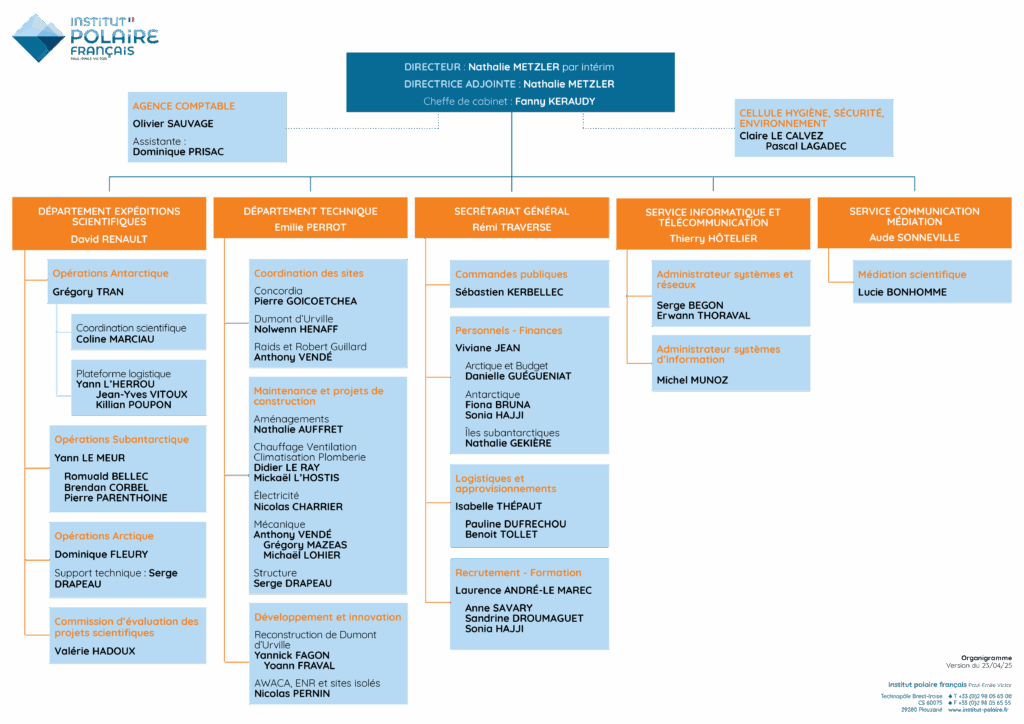Quick access

Organisation
Personnel at Headquarters
The Headquarters (HQ) of the Polar Institute hosts thirty or so permanent members, some of whom are on leave from the CNRS. The rest of the personnel are employed under private law contracts and are regarded as staff members. This staff is distributed among the following structures:
- Directorate
- Independent accounting agency; it ensures the verification of the Institute’s accounts,
- The Communication and Scientific Mediation Department; it communicates on the activities of the Institute and the research projects it supports,
- Science and Technology Department; it manages the interface with the scientific committee and the project leaders during the selection phase; it interacts with the operational staff for the deployment of research projects,
- Operations Department; it manages all operations related to infrastructure, planning and logistic organization in the Arctic, Antarctic and sub-Antarctic islands,
- Administrative and Financial Department; it manages the Institute’s budget, personnel, public contracts, supplies, and sea and air freight to the gateways of the districts where the Institute operates,
- Human Resources Department; it ensures the recruitment, training of personnel and the follow-up of the forward-looking management of jobs and skills,
- Telecommunications, IT and Instrumentation Department; it manages the IT equipment at headquarters and in the research stations, the networks, the databases and certain instrumental developments in the field.
The Institute uses fixed-term contracts in order to temporarily add personnel to its teams at the headquarters.
Some of the headquarters personnel carry out missions in the field and therefore they are present in the Arctic, Antarctic or in the Subantarctic Islands during the summer campaign.

Personnel in the field
Two different categories of Institute personnel work in the field:
- Summer campaigners, who are in the field anywhere from several weeks to several months during the austral summer. Some personnel are in charge of technical maintenance and station development projects. Others perform activities that are needed in order to carry out scientific projects, in addition to or sometimes replacing the team members who have submitted a project.
- Overwinterers, who stay in the field for a little more than one year. During the austral winter, these personnel are tasked with ensuring the proper functioning of the station and continuing scientific activities that require measurements, observations, experiments or sample collections to be carried out all year long. During the summer, they take part in projects just like the summer campaigners and, at the same time, are trained so that they can take on their responsibilities in the future.c
The profiles and distribution of the personnel vary depending on the Polar Institute’s responsibilities at the various sites.
In the Subantarctic Islands, the Institute is only responsible for the management of the huts and not the stations themselves, and for the implementation of scientific projects; therefore, its overwintering personnel is primarily made up of scientists and several support functions (IT, electronics, coordination). During the summer campaign, members of the ‘Subantarctic operations’ department carry out activities with the overwintering personnel, and are sometimes accompanied by one or two ‘technical’ personnel (e.g. carpenter, boilermaker) from the summer campaign depending on the intended work sites.
In the Arctic, the stations are managed by a private Norwegian company. Therefore, only personnel from the ‘Arctic Scientific Operations’ department join the overwintering team during the summer.
Board of directors (BOD)
The Institute is governed by a board of directors (BOD) made up of representatives of the signatory members of the public interest group who have votes corresponding to the rights mentioned in the agreement.
The following people are consultants on the Board of Directors: a representative of the Minister for the Environment, a representative of the Minister for Overseas Departments and Territories, the government commissioner, the State Controller, the Director of the Institute as well as two eminent outside figures designated by the Board of Directors for their expertise.
Members of the Board of Directors are appointed for a renewable four-year term. The BOD elects its Chair from among the outside figures for a renewable four-year term.
Members of the Board of Directors
President : Ms Catherine RITZ
Ministry of Higher Education and Research: Ms Lise FECHNER (49% of rights)
Ministry of Europe and Foreign Affairs: Mr Jérémie FORRAT-JAIME (1% of rights)
Ifremer: Mr François HOULLIER (5% of rights)
TAAF: Mr Charles Giusti (1% of rights)
CNRS: Mr Nicolas Arnaud (36% of rights)
Météo France: Mr Alain Soulan (1% of rights)
CNES: Ms Mioara MANDEA (1% of rights)
Ministry for Overseas France: Ms Camille Servetto
Government Commissioner: Ms Isabelle DELACROIX – Ministry of Higher Education and Research
Economic and Financial Controller General: Mr Olivier CAILLOU
External Personality: Ms Marie-Noëlle HOUSSAIS
Observers:
Elsa CORTIJO – The French Alternative Energies and Atomic Energy Commission (CEA)
Ms Maude JOLLY – Ministry of Ecological Transition (MTE)
The role of the Board of Directors (BOD) is to:
- examine and set the Institute’s major Science and Technology strategies,
- decide on the annual operations programme and corresponding budget, including recruitment planning where necessary,
- approve the accounts for each financial year,
- appoint outside figures,
- elect and terminate the duties of the Board of Directors’ Chair,
- appoint and terminate the duties of the Director,
- appoint and terminate the duties of the Members on the Council for Polar Science and Technology Programmes (CPST),
- authorize the French Polar Institute’s stake acquisition in other legal entities,
- conclude contracts for amounts exceeding the Board of Directors pre-set sum and make joint agreements with enterprises or organizations outside the interest-group’s Members,
- approve the Board of Director’s internal regulations and financial regulations.
The Board of Directors appoints a Director for a renewable term of four years. It also has the authority to terminate the Director’s term of office. If that mandate is interrupted, for whatever reason, the Director is replaced for the remainder of the term of office. Their replacement attends General Assembly and Board of Directors meetings with a consultative vote.
The Director is responsible for running the Institute under the authority of the Board of Directors, and under the terms and conditions set by the BOD. The Director submits an annual management report to the Board of Directors every year.
The Board of Directors traditionally meets three times a year, in March, June and December.
Council for Polar Science and Technology Programmes (CPST)
The Council for Polar Scientific and Technological Programs is responsible for assessing the scientific or technological value of terrestrial scientific projects submitted to the Institute, in addition to making recommendations on the implementation of these projects, on the Institute’s scientific and technical actions and on the Institute’s international scientific and logistical cooperation policy.
The CPST is made up of sixteen members: the Chair of the Polar Environment Committee is an ex-officio member. The five member organizations of the GIP propose a member who is chosen for their skills from among the various different actors in the scientific programmes carried out in Polar Regions.
The Minister of Research proposes 10 members- five French specialists in the major scientific fields related to the Institute’s missions and five foreign specialists.
CPST members exercise their mandate free of charge over a four-year mandate period that can be renewed once.
CPST members
Chairman : Jean-Daniel Paris
Vice-Chairman: Lenaick Menot.
Chairman of the Polar Environment Committee, ex officio member : Jean-Philippe Siblet, Director of the UMS Natural Heritage
Appointed members:
- Jean-Daniel Paris, Climate and Environmental Sciences Laboratory
- Étienne Berthier, Space Geophysics and Oceanography Laboratory
- Matthieu Chevallier, Head of the Marine Forecasting and Oceanography Department, Forecasting Operations Directorate, Météo France
- Lénaïck Menot, Deep Environment Laboratory, Ifremer
- Cécile Engrand, Astronomy
- Vincent Coudé du Foresto, Laboratory of Space Studies and Astrophysical Instrumentation, Paris Observatory
- François Costard, Geophysics, astrophysics
- Béatrice Collignon, Cultural and social geography
- Frédéric Parrenin, Glaciology
- Claire Alix, Ethnology, anthropology
- Bruno Danis, Marine biology
- Massimo Frezzotti, Agenzia nazionale per le nuove tecnologie, l’energia e lo sviluppo economico sostenibile
- Marion Maturilli, Alfred Wegener Institute
- Najat Bhiry, Centre for Nordic Studies
- José Carlos Caétano Xavier, Mare and environmental research centre, Coimbra
Guest members :
- Marie-Noëlle Houssais, INSU
- Gilles Pinay, INEE
- Stéphanie Vermeersch INSHS
- Paul Laforêt, TAAF medicine